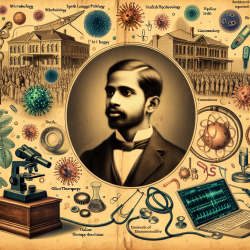In the world of public health and microbiology, few figures have had as profound an impact as Joseph James Kinyoun. As practitioners in the field of speech language pathology, we can draw significant lessons from Kinyoun's pioneering work and dedication to data-driven research. This blog post explores how we can implement the outcomes of Kinyoun's research to improve our practices and encourage further investigation into historical and contemporary public health challenges.
Understanding Kinyoun's Contributions
Joseph James Kinyoun, the founder of what is now known as the National Institutes of Health (NIH), was a visionary in the field of microbiology. His establishment of the federal Hygienic Laboratory in 1887 marked the beginning of a transformative era in public health. Kinyoun's work laid the groundwork for many of the diagnostic and therapeutic techniques that we take for granted today.
Implementing Research Outcomes in Practice
As speech language pathologists, we can learn from Kinyoun's methodical approach to research and its application to real-world problems. Here are some ways to incorporate these principles into our practice:
- Embrace Data-Driven Decisions: Just as Kinyoun used data to inform his public health strategies, we should rely on evidence-based practices to guide our therapy decisions. Collecting and analyzing data on therapy outcomes can help us refine our methods and improve patient care.
- Interdisciplinary Collaboration: Kinyoun's work was characterized by collaboration with other scientists and institutions. By working closely with other healthcare professionals, we can develop comprehensive treatment plans that address all aspects of a child's needs.
- Continuous Learning: Kinyoun never stopped learning and adapting to new scientific discoveries. Staying current with the latest research in speech language pathology ensures that we are providing the best possible care to our clients.
Encouraging Further Research
Kinyoun's legacy reminds us of the importance of ongoing research. As practitioners, we should not only apply existing knowledge but also contribute to the advancement of our field. This can be achieved by:
- Conducting Original Research: Identifying gaps in the current literature and designing studies to address these gaps can lead to new insights and improved therapies.
- Participating in Professional Development: Attending conferences, workshops, and seminars helps us stay informed about the latest research and best practices.
- Mentoring Future Researchers: Encouraging and supporting the next generation of speech language pathologists in their research endeavors ensures the continued growth and development of our field.
To read the original research paper, please follow this link: The Forgotten Forefather: Joseph James Kinyoun and the Founding of the National Institutes of Health










